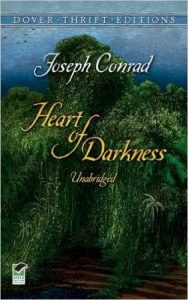Heart of Darkness
Book written by Joseph Conrad
English class in America follows a pretty standard progression as you move from grade to grade. They get you reading with Dick and Jane or whatever might be in vogue at the time. Then they worry about whether or not you can drag a pencil across paper in something reasonably legible. Next comes the introduction of rules- grammar and spelling. Depending on the school system and teacher inclination, this can go deep and turn into quite the series of unending drills or everyone might decide that texting and spellchecker means that this is unimportant. Through it all, books are assigned for reading.
Then, somewhere in high school, all of this is supposed to come together. The teacher turns to the class and starts asking probing questions about the book that everyone has hopefully read. With any luck, the students begin to notice a certain depth to the text before them. If it hasn’t been banned, the teacher is liable to delve deep into The Adventures of Huckleberry Finn. They will likely describe it as the first great modern American novel. To prove this, they may share the scholarly work that breaks Huck’s world down between the raft and the shore, finding each to be a metaphor for some dichotomy, usually civilization and individual freedom.

I’m not knocking the analysis.
Themes in art may be placed there by the creator, but the audience takes away what it will. We could argue all day about how much Mark Twain intended with his tale, but I’m not sure his intentions matter to the reader. Of course, the secondary matter of having an interpretation explained clouds the discussion. If someone tells you that Twain’s book is racist, for instance, then does it become so for you? Is that a less valid reaction than reading other unintended depth? As near as I can tell, the most important distinction is how we view the artist as a person. If neither was Twain’s intention, then that makes him a little less brilliant, but also a better human being.The other great river novel in English is Heart of Darkness. I have little doubt that Conrad meant every bit of thematic statement in his book. Considering that he wrote near the tail end of Twain’s life, the difference is illustrative. Both Finn and Marlow are on journeys of discovery. Both end with returns to home and civilization. Finn goes down river while Marlow goes up. Proceed with your Ph.D. thesis from here…
Conrad, like his contemporary Franz Kafka, marks an interesting break with earlier authors. As if he attended all those high school classes where meaning was found beneath the surface of the text, Conrad overtly imbued his work for later interpretation. At the same time as other art forms became self-aware, Conrad initiated the modern novel.
What’s it all about?
You’ve Got to Check This Out is a blog series about music, words, and all sorts of artistic matters. It started with an explanation. 145 more to go.
New additions to You’ve Got to Check This Out release regularly. Also, free humor, short works, and poetry post irregularly. Receive notifications on Facebook by friending or following Craig.
Images may be subject to copyright.